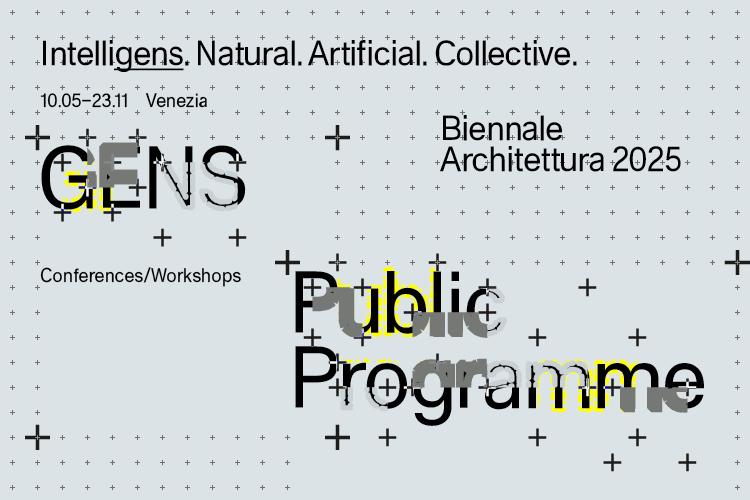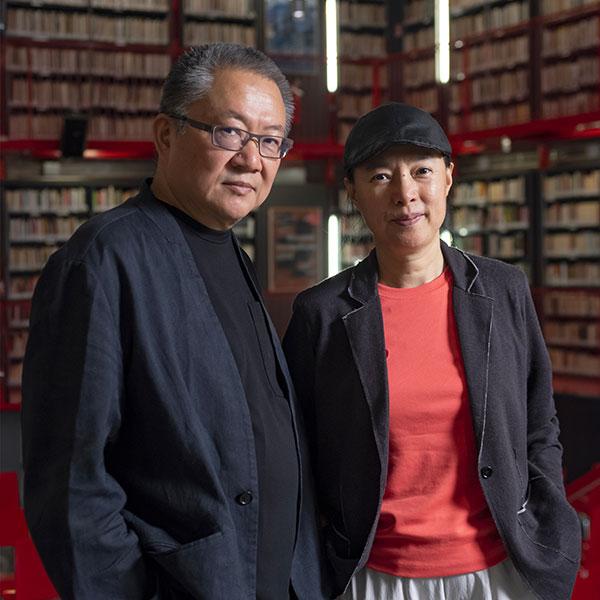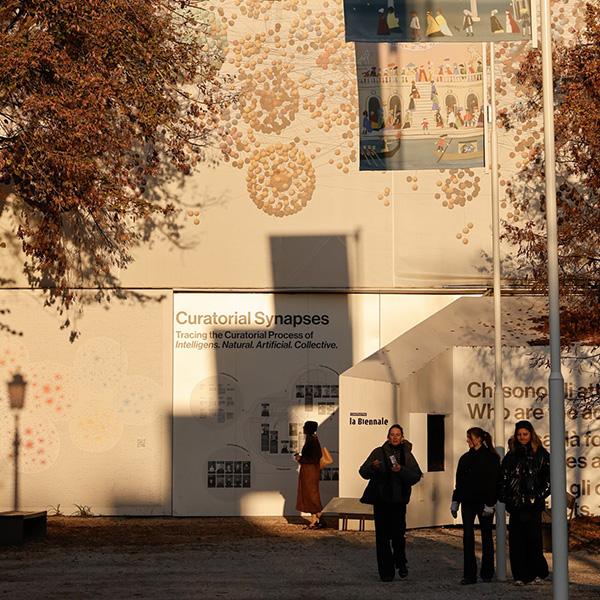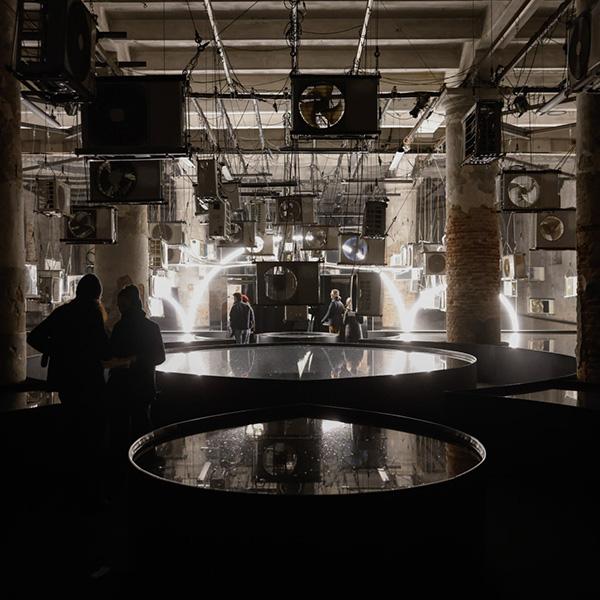
Conferences and Workshops scheduled for the month of September
GENS Public Programme: the September events to be held at the Speakers’ Corner at Corderie dell’Arsenale.
GENS Public Programme
The capacity to adapt to climate change, the protection of heritage, and social transformations are at the heart of the September events of the GENS Public Programme, which accompany and enrich the 19th International Architecture Exhibition – La Biennale di Venezia titled Intelligens. Natural. Artificial. Collective., curated by Carlo Ratti (10 May – 23 November 2025). The meetings, held at the Speakers’ Corner at the Corderie dell’Arsenale, explore urban and environmental challenges, architectural and circular experimentation, future scenarios linked to artificial intelligence, and practices of participation and co-design.
To enter the Corderie dell’Arsenale and the Speakers’ Corner, visitors must hold a valid exhibition ticket for Biennale Architettura 2025.
Conferences
Friday, 26 September
3:00 pm – 5:30 pm
Session 1 – Adaptation strategies for a Climate Change that cannot wait: engineering for territories and Cultural heritage
The event, organized, in collaboration with Soft Power Club, is scheduled for Friday 26 and Saturday 27 September and explore the current and future impacts of climate change, starting with coastal cities and communities, which are facing increasing and sometimes disruptive phenomena: rising seas and oceans, erosion and subsidence that now affect hundreds of millions of people. The life and organisation of cities and metropolises, historical, archaeological and monumental cultural heritage and urban landscapes, infrastructure and architecture: for many communities, these are already having to contend with the dangers of flooding, extreme heat and the prospect of further threats. The meeting aims to provide the most up-to-date and qualified scientific information on these issues and to examine advanced experiences and proposals for urban, architectural, ecological, technological and monitoring programming, planning and design to contribute to sustainable and regenerative urban and territorial adaptation strategies.
Speakers: Pietrangelo Buttafuoco (President of La Biennale di Venezia), Marco Lombardi (CEO of Proger), Erasmo D'Angelis (President of the Earth Water Agenda Foundation), Giulio Boccaletti (Scientific Director of CMCC – video message), Federica Brancaccio (President of ANCE), Paola Darò (Proger MENS Consortium – Sacertis), Alberto Tripi (President of Almaviva and Member of Soft Power Club – video message), Chicco Testa (Vice President of Proger).
Moderated by Francesco Rutelli.
Saturday, 27 September
3:00 pm – 5:00 pm
Session 2 – Adaptation strategies for a Climate Change that cannot wait: engineering for territories and Cultural heritage
This second session is specifically dedicated to threats - and design, technical, monitoring and implementation responses - affecting cultural heritage; archaeological sites, monuments and historic centres affected by extreme heat and drought, as well as rising water levels and flooding.
Speakers: Carlo Ratti (Curator 19th International Architecture Exhibition), Arianna Traviglia (Centre for Cultural Heritage Technology CCHT, Coordinator), Alessandra Bonazza (Coordinator of Research Macroarea “Impacts on Environment, Cultural Heritage and Human Health” Institute of Atmospheric Sciences and Climate, National Research Council of Italy, Bologna), Christian Hanus (Scientific Director of the Research Lab Sustainable Cultural Heritage, Full Professor Danube University Krems), Liborio Stellino (Permanent Representative of Italy to UNESCO and BIE), Marco Lombardi (CEO of Proger).
Moderated by Francesco Rutelli.
Workshops
Monday, 1 September
4:00 pm – 6:00 pm
City as Stage – How Culture & Architecture Shape Urban Identity
At the intersection of architecture, cinema, and memory, we find the emotional infrastructure of place. This conversation explores how buildings and cities perform—not just as passive backdrops, but as protagonists. How does narrative shape architecture? How do events like the International Architecture Exhibition of La Biennale di Venezia and the Venice International Film Festival of La Biennale di Venezia influence the way we see, feel, and remember a place? How do the built and imagined worlds mirror and inspire each other?
Speakers: Prathima Manohar (Chair, The Urban Vision & Co-Founder, GoodPass), Sam Lubell (Architecture Journalist), Mario Cucinella (Architect, MCA – Mario Cucinella Architects), Naresh V. Narasimhan (Principal Architect, Venkataramanan Associates), Luisa Bravo (Public Space Scholar, City Space Architecture).
Tuesday, September 2
4:00 pm – 6:00 pm
Shape Rural Futures: Reclaiming Institutional Capacity
Many institutions today are structurally misaligned with rapidly evolving environmental, demographic, and technological conditions. This lecture explores how designers can help shape new institutional forms to support territorial regeneration. It considers how values, drive, and expertise can enable long-duration projects that outlast individual contributions and respond more effectively to the complexities of systemic transformation.
Speakers: Ginevra D’Agostino (President, Liminal), Nicolás Delgado Alcega (Vice-President, Liminal).
Friday, September 5
3:00 pm – 5:00 pm
X-UTOPIA: Vision of The Future
An international group panel convened by X–UTOPIA explores utopias through design, anthropology, technology, and education. Featuring architects, artists, and researchers, the discussion spans rural–urban futures, language, collectives, biodesign, AI, and speculative education. Drawing on global case studies and past inspirations, the event weaves together diverse disciplines to imagine new models for living, learning, and shaping the future.
Speakers: Dorota Olsavska (Anthropologist, FUTURESEARCH STUDIO and X–UTOPIA), Jozef Olsavsky (Architect, FUTURESEARCH STUDIO and X–UTOPIA), Katarina Smatanova (Head of Urban Design, FADSTU), Eliesh Sahyoun (Futurologist, IMREDD), Michal Hladky (Architect, CIKE), Mitch Joachim (Architect, Terreform ONE and NYU), Benjamin James (Architect, ATLAS.DESIGN), Winy Maas (Architect, MVRDV and ARCHIP), Bernd Fesel (Director, EIT Culture and Creativity), Viktoria Mravcakova (SPOLKA and UMPRUM).
Saturday, September 6
1:30 pm – 5:00 pm
Will the AI-powered robots of the future be self-aware?
In the near future AI-powered humanoid robots may co-exist with us. What will these robots be like? Will they have some form of awareness of their own bodies and thinking? Will they have a personality, a narrative self, with moral and emotional facets? Can such robots ever be trusted, or will they inevitably start scheming against us?
Speakers: Stanislas De Haene (Collège de France), Takashi Ikegami (University of Tokyo), Luc Steels (University of Brussels), Thomas Metzinger (University of Mainz), Stefano Nolfi (CNR, Rome), Riccardo Manzotti (IULM Milan), Vittorio Loreto (Sapienza Università di Roma and Sony Computer Science Laboratories Rome).
Moderated by Oscar Villaroya (Autonomous University Barcelona and IMIM).
Tuesday, September 9
2:00 pm – 3:00 pm
Architecture as a catalyst for cultural transformation and community engagement. Lessons from Sant'Agostino in Modena
This panel explores Modena’s AGO project as a driver of cultural, social, and urban transformation. From the regeneration of the former Sant’Agostino complex, AGO emerges as a cultural agora fostering engagement, creativity, and participation. Italian and international voices will discuss architecture, proximity, and cultural programming as engines of inclusive, dynamic, and evolving urban development.
Speakers: Carlo Ratti (Curator of the 19th International Architecture Exhibition and Designer of the Sant’Agostino Complex – 2nd Phase), Matteo Tiezzi (President of Fondazione di Modena), John Durant (Associate Professor in the Science, Technology and Society program at MIT).
Moderated by Stefano Salis (Journalist and Chief Editor of the Comment and Domenica sections at Il Sole 24 Ore).
Friday, September 12
3:00 pm – 6:00 pm
MAKING CARE. Architecture, engineering and well-being
The workshop, promoted by the Politecnico di Milano, is a moment of reflection on the role of the polytechnic culture in promoting well-being, in its broadest sense, through the proactive role of architecture and the physical environment, as a driver of social, environmental, technological and design innovation, accelerated today by the new frontiers of Artificial Intelligence.
Speakers: Donatella Sciuto (Rector, Politecnico di Milano), Stefano Capolongo (DABC – Politecnico di Milano).
Session I – Paolo Chiariotti (DMECC – Politecnico di Milano), Maria Pia Pedeferri (CMIC – Politecnico di Milano), Manuela Antonelli (DICA – Politecnico di Milano), Raffaelle Brumana (DABC – Politecnico di Milano).
Moderated by Ingrid Paoletti (DABC – Politecnico di Milano).
Session II – Giuseppe Andreoni (DESIGN – Politecnico di Milano), Venere Ferraro (DESIGN – Politecnico di Milano), Viola Schiaffonati (DEIB – Politecnico di Milano).
Moderated by Massimo Bricocoli (DAStU – Politecnico di Milano).
Session III – Alessandro Perego (DIG – Politecnico di Milano), Cristiana Bolchini (DEIB – Politecnico di Milano), Mario Calderini (DIG – Politecnico di Milano).
Moderated by Massimo Bricocoli (DAStU – Politecnico di Milano).
Conclusions: Carlo Ratti.
Saturday, September 13
3:00 pm – 6:00 pm
Lithic Landscapes: Performative Futures and Circular Methodologies
The Exhibition project Lithic Chords explores stone as a dynamic, performative material through three interwoven threads: its presence in landscapes and memory, its structural potential through post-tensioning, and its acoustic resonance in sound performance. Blending geology, engineering, and art, the project reveals stone as active and expressive: shaping environments, supporting innovation, and echoing across time to deepen our understanding of architecture and matter.
Speakers: Cristina Morbi (Director Maetherea and Lecturer at The Bartlett School of Architecture UCL), Oliver Wilton (Director of Technology, The Bartlett School of Architecture UCL), Andrea Granitzio (Musical Director Fondazione Sciola and Lecturer Politecnico di Milano), Francesco Banchini (Structural Engineer SBP), Pierre Bidaud (Creative Director The Stonemasonry Company), Domenico Cereser (CEO Cereser Verona).
Moderated by Cristina Morbi (Director Maetherea and Lecturer at The Bartlett School of Architecture) Oliver Wilton (Director of Technology, The Bartlett School of Architecture UCL).
Tuesday, September 16
12:00 noon – 2:00 pm
Arquitecture at the edge of Architecture. Suburbs: The Unexpected Urban Frontier, from Otherness to Innovation
The suburbs, often treated as the “otherness” in relation to the city, are laboratories where the energy of the city is still present and where the "Intelligens" can escape the control of centralised planning and, thanks to this freedom, experiment with models, strategies and dynamics for inhabiting the city of the future.
Speakers: Franco Bunčuga (architect and author), Alessandro Zorzetto (Architetture Precarie; PhD candidate in Architecture, University of Seville), Hannah Baghuis (PhD candidate, Politecnico di Milano; Research scholar - SSA; City College of New York), Gianluca Stasi (Studio Ctrl+Z; PhD in Architecture, University of Seville).
Moderated by Paolo Bon (Studio Architettura Paolo Bon).
Wednesday, September 17
3:00 pm – 5:00 pm
Pavilions – Mediums for Experimentation in Architecture
This event explores the potential of pavilions as tools for experimentation, engagement, and critical reflection in architecture. Through short dialogues with invited speakers and a panel discussion, it aims to spark a broader conversation around this underrepresented topic in both practice and academia.
Speakers: Cristoph Zechmeister (Group Lead of Computational Fiber Architecture Research Group at ICD), So Sugita (Lead of Hiroshima Design Lab at Hiroshima Institute of Technology), Andrea Bocco (Professor of Technological and Environmental Design of Architecture at the Politecnico di Torino), Giorgio Castellano (founder of Baka Studio and member of Material Balance MABA Lab at Politecnico Milano), Matyas Gutai (Loughborough University), Redina Mazelli (Politecnico di Torino, DIST).
Moderated by Matyas Gutai (Loughborough University), Redina Mazelli (Politecnico di Torino, DIST).
Thursday, September 18
3:00 pm – 5:00 pm
Liquid Architectures: Building Collective Knowledge Alongside Water Communities in Latin America
How are water communities protecting native species and ecosystems while improving common living conditions in Latin America? Learn about collaborative design strategies and pedagogies of care for the mangrove ecosystem at work in the project CUNA - Porous School for Landscape Construction, located in Barranquilla, Colombia, in connection with similar art-architecture-education experiences in the Global South.
Speakers: Amina Chouairi (landscape architect / Università Iuav di Venezia); Miguel Braceli (co-founder of LA ESCUELA___); La Orilla architecture studio (co-designers of the CUNA school project); Joachim Gerstmeier (Head of Arts & Culture at Foundation Siemens Stiftung—co-founding institution of LA ESCUELA___).
Saturday, September 20
4.00pm – 6.00pm
Relational Landscape: development without growth in Venice
Porto Marghera – the indispensable and segregated half of Venice – is an unfinished canvas. We liked to imagine a centuriatio: spaces granted between productive fields. Yet on the disputed way to a common ground, we believe multiple perspectives must compete. We conceive intelligence to be collective and confrontational, so we map and explore this land using the format of a simulation game: a database to be built, and a model to be run – a tool to design.
Speakers: Charles André (Architect) and Martina Bertani (Architect), Gabriella Chiellino (Lecturer, environmental entrepreneur, active in the Venice area), Cristiana Colli (Journalist and curator), Lorenzo Feltrin (Post-doctoral researcher, Department of Humanities, Ca’ Foscari University of Venice), Massimiliano De Martin (Councillor for Urban Planning, City of Venice), Jane da Mosto (Environmental scientist, director and founder of We are here Venice), Pietro del Soldà (Philosopher, author, radio host and lecturer), Stefano Zoli (Director and co-founder of Terrapreta).
Moderated by: Charles André (Architect) and Martina Bertani (Architect).
[UN:SET]
Developed by the University of Siegen (N_AS), [UN:SET] is an experimental lab held over two separate sessions, on September 21 and 23, that reimagines architectural education through participatory formats. A two-day programme – including a conference and a collective workshop – explores AI, public space, and pedagogy to challenge dominant systems and visualize new narratives through collective action, urban interaction, and digital tools.
Sunday, September 21
12:00 noon – 4:00 pm
Speakers: Sabine Pollak (Austrian Pavilion), Bert Bielefeld (University of Siegen), Tobias Hönig (University of Siegen), Carolin Riedel (University of Siegen), Thorsten Erl (University of Siegen), Astrid Wuttke (University of Siegen).
Tuesday, September 23
12:00 noon – 5:00 pm
Speakers: Joelle Klein (University of Siegen), Martin Appel (University of Siegen), Berit Jaegels (HCU – HafenCity University Hamburg), Florian Schönauer (University of Siegen), Lea Nierzwicki (University of Siegen), Edda Voitz (University of Siegen), Veronika Mihalji (University of Siegen), Vivien Centelles (University of Siegen), Cemile Gümüssoy (University of Siegen), Ipek Daimagüler (University of Siegen), Malte Nickel (University of Siegen), Waldemar Paschkin (University of Siegen), Luke Hohage (University of Siegen).
Wednesday, September 24
2:00 pm – 5:00 pm
Intelligens in Action: Climate, Community and the Collective Classroom
The conference and roundtable explore the role of educating communities in tackling climate and social challenges. The event stems from the SEMI di SAD project against educational poverty and involves educational and institutional actors. Through dialogue and co-design, it promotes civic participation. The Exhibition project Urban Heat Chronicles will be the case study to reflect on education, design, and civic action as tools for transformation.
Speakers: Anna Doneda (General Coordinator, Project for People ODV), Emma Greer (Architect, Urban Planner at C40 Cities), Elisabetta Bianchessi (Architect, Landscape Architect, Community Designer at T12 Lab), Maria Teresa Bellucci (Deputy Minister of Labour and Social Policies), Gaia Romani (Councillor for Decentralization, Districts and Civic Participation, City of Milan), Antonella Caleffi and Francesco Muraro (School Principals, IC Perasso and IC Cappelli, Milan), Vincenzo Curatola (President of ForumSAD and ARCE Representative), Luca Poncellini (Director, Department of Design and Applied Arts, NABA Milan), Nina Bassoli (Curator for Architecture and Urban Regeneration, Triennale Milano), Federica Patti (Architect, PhD in History of Architecture and Urban Planning, Technology Teacher), Irene Guida (Architect, PhD in Urban Planning, Applied Mathematics Teacher), Sara Banti (Chief Editor of Abitare).
Interactive breaks by Alberto Wolfango Amedeo D’Asaro and Giuseppe Maria Paolillo (Quasi Quasi Association).
Thursday, September 25
3:00 pm – 5:30 pm
Natural Artificial
The relationship and dialogue between all that is natural and all that is artificial, the interweaving of disciplines that enable the use of new and more extraordinary technologies and forms of artificial intelligence to recreate natural conditions in society and the environment.
Sunday, September 28
4:00 pm – 6:00 pm
Thinking hands constructing our collective response to the climate crisis
Approaching the end of a historical cycle of extraordinarily stable living conditions, farmers and architects reconsider the common root of their activities and decide to build walls as if already collapsed in order to permit new human settlements to expand horizontally into huge surfaces of land, first degraded then abandoned by industrial agriculture, thereby creating new water retention landscapes and resolving the climate crisis in one generation.
Speakers: Marta Cataldi (Futuro Vegetale, Florence, Italy), Prof. Alberto Mataran Ruiz (University of Granada, Spain), Claudio Naviglia (Rete Humus, Italy), Global Warming Mitigation Project (USA), Prof. Tina Gregoric (dekleva gregoric architects, Ljubljana, Slovenia), Prof. Els Verbakel (Bezalel Academy of Arts and Design, Jerusalem, Israel), Dr. Arielle Blonder (Technion Institute, Haifa, Israel), Josef Holzer (Holzer Permaculture Solutions Ltd, Austria), Maria Teresa Cutri (Eco Urban Project, Rome, Italy), Giovanni Spaliviero (Associazione Musoco Onlus, Venice, Italy), Virginia Stammitti (Italy), Beatrice Cavallari (Italy), Mariella Gentile (Campo Saz, Italy), Noemi Fiorino (Consortium of Buffalo Mozzarella, Italy), Yael Plat (Italy), Emilio Di Biase (Italy), Matteo Mancini (Deafal ONG, Italy), Giacomo (Cooperativa Coraggio, Rome, Italy), Ray Steele (Regenerosity), Stephen Wright, Tamarind Rossetti, Ania Corcilius (Kuenstlerhaus Stuttgart, Germany), Jazmin Charalambous, Felix Mohr (Stuttgart, Germany), Caterina Miralles Tagliabue (Barcelona, Spain), Giovanni Aloi (School of the Art Institute of Chicago, USA).
Tuesday, September 30
11:00 am – 1:30 pm
2:30 pm – 5:00 pm
Inhabiting hostly spaces
Who are our favourite neighbours, and how do they make us feel better? Inspired by the values of the 2.73 project, this workshop explores hospitality and co-habitation through simple paper models. Participants work in small groups to imagine a building prototype, balancing co-living areas, private spaces, and hosting zones—reimagining the citizen as a prosumer of shared living environments.
Speakers: Luca Barello (Atelier Mobile aps), Giordana Ferri (Fondazione Housing Sociale), Alvise Giacomazzi (B_G Studio), Sabina Lenoci (IUAV University of Venice).
Programme of events
GENS Public Programme is a programme of events to reach out to an audience beyond architecture and other disciplines in an experiential exploration of the Exhibition’s themes.
GENS unfolds through a series of Conferences, Workshops, and other encounters. This large-scale public programmes will take place through the Exhibition in collaboration with international non-profit organizations, think-tanks, foundations, alliances, groups, and universities that delve into topics ranging from AI’s impact on creativity to the ecosystems of smaller cities.
Conferences, where scientists, artists, activists, students, politicians and practitioners all come together to showcase the breadth of human approaches to adaptation, will convened at the Speakers’ Corner, designed by Christopher Hawthorne (Senior Critic, Yale School of Architecture), Johnston Marklee (Johnston Marklee & Associates), and Florencia Rodriguez (Director, University of Illinois Chicago School of Architecture), with the support of the Lincoln Institute of Land Policy, where scientists, artists, activists, students, politicians and practitioners all come together to showcase the breadth of human approaches to adaptation.
The public is encouraged to visit the official website of La Biennale di Venezia for further information and updates on the GENS Public programme




